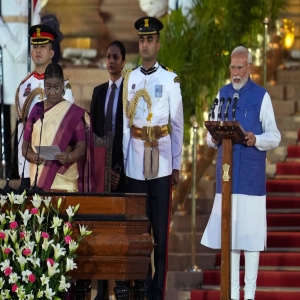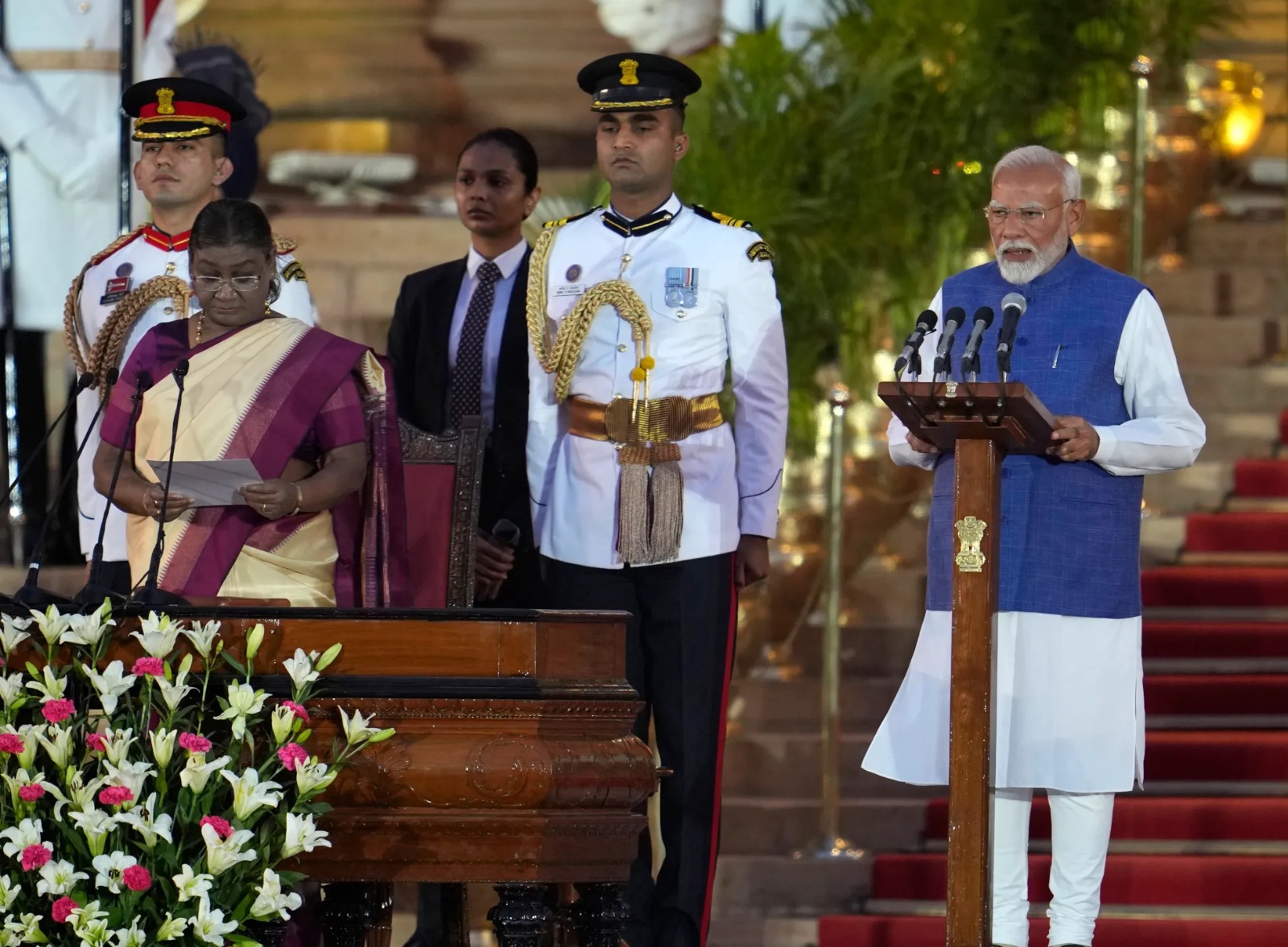
.jpg) Mathew John
Mathew John

The political reality in the country today is that the king is not dead but greatly diminished in stature. For the last ten years, he did "bestride the world like a Colossus and we petty men walked under his huge legs…" but the fractured Lok Sabha mandate, with no single party getting a majority, has suddenly reduced the self-proclaimed divine being to an ordinary earthling. He becomes the Prime Minister for a third consecutive time, propped up by an assortment of dangerously capricious allies in the NDA. What does this portend for the country?
It was a wise man who observed that a leopard doesn't change his spots or his character just because he has been dislodged from the habitat where he was all-powerful and is now obliged to operate in surroundings where all are equal and where there are new rules to be observed. It is true that the tyrant's wings have been clipped, but does that ensure the safety of the Republic? Will the cutting down to the size of the bloated 56-inch chest restore our democracy and its sacred constitutional pledge of justice, equality, fraternity and respect for every human being?
Most political observers believe that by giving no single party a majority and electing a strong, combative Opposition, the people of India have ensured the much-needed return to the cut and thrust of normal politics and forced the retreat of the unaccountable governance of the last few years marked by subversion of the law, the brazen misuse of the law-enforcement agencies, a dangerously divisive brand of politics and the in-your-face promotion of crony capitalism.
I may sound like a Cassandra, but these fond expectations seem too good to be true. For such a radical transformation to happen, Modi would need to undergo a complete reboot of character and style. The evil intent, the arrogance, the unseemly third-person singular braggadocio and cunning will have to be replaced by humaneness, humility and statesmanship. Caesar will have to become a team man. But that's asking for the moon!
To understand the true nature of the man who will be leading the country as Prime Minister for a third successive term, one needs to recapitulate Ashish Nandy's clinical diagnosis of Modi in 1992 when he was an ordinary RSS pracharak: "Here was a classic, clinical case of a fascist … Modi met virtually all the criteria that psychiatrists, psycho-analysts and psychologists had set up after years of empirical work on the authoritarian personality. He had the same mix of puritanical rigidity, narrowing of emotional life, massive use of the ego defence of projection, denial and fear of his own passions combined with fantasies of violence – all set with the matrix of clear paranoid and obsessive personality traits."
Such a man is unlikely to submit to the established norms of democratic functioning except as a ruse. Modi's first two speeches after the election results, to his party members and then in the NDA meeting in Parliament on the 7th, showcased the same stale, hackneyed mix of self-congratulation, vituperation, evasions and falsehoods. He couldn't restrain himself from taunting the Opposition with the cheap jibe: "EVM zinda hai!" The only glaring deviation from his past rhetoric was his avoidance of the nauseating third-person singular when talking about himself. Everyone saw through that fake humility born out of compulsion.
Having seen and listened to the grovelling sycophancy of his NDA allies at the meeting, it is evident that these men of straw will readily function as doormats in exchange for position and pelf. As such, amidst the euphoria of denying the BJP a clear mandate, we must not lose sight of the fact that so long as Modi is at the helm, he poses a potent threat to our democracy.
There is no doubt that Modi and gang would already have hatched plans to bring back the 'good old days' prior to this election when they had an absolute majority and did as they pleased. They will do their darndest to entice the independents and vulnerable parties across the political spectrum with all kinds of blandishments, though the customary resort to blackmail may have to be shelved for the time being. And they will, in all probability, succeed in making new allies as they have the wherewithal in terms of unimaginable money power magnified by the support of the biggest, most unscrupulous corporates whose businesses have grown immeasurably in the last ten years.
Even the diminished Modi will wield immense powers. Unlike the President of the USA, whose powers are circumscribed by the Senate, the House of Representatives and the 50 State governments, the Prime Minister of India is vested with enormous clout, both statutory and discretionary, prompting commentators to attribute to him the powers of a monarch. Whether a person who becomes PM functions as a democrat or a dictator depends on his 'niyat' (the inadequate English translation is 'good or bad intention').
Atal Bihari Vajpayee and Manmohan Singh were democrats and governed with good intent, a quality that has never been associated with Modi, who is incapable of rising above self-interest. In a lethally effective subversion of democracy, the Modi regime bent the institutions of governance to do its bidding without tampering with the Constitution, vindicating Montesquieu's warning that there is no greater tyranny than that which is perpetuated under the shield of law and in the name of justice.
He cocked a snook at federalism by denying the rightful funds due to the States; the legitimate demands of the Opposition in Parliament were ignored or shouted down; he decided unilaterally on priorities for investment in the various sectors treating the Government treasury as his own piggy bank. Every ministry had the RSS Gestapo monitoring what was happening. Will this modus operandi of running the government change this time around?
Among his wide-ranging powers, the PM appoints the members of his cabinet and approves postings in the higher echelons of the armed forces, the civil services, public statutory bodies, even constitutional posts of Governors, the ECI, and what have you. In the last ten years, Modi has hollowed out every organisation. Setting aside merit and professional suitability, he has appointed saffron-tainted 'ghuspetiyas' in key government organisations like the UPSC and the UGC.
Despite now being the head of a coalition government, his powers as PM potentially remain intact and undiminished. There's really nothing to stop him from continuing to stack the public sphere with ideologically like-minded individuals, even if professionally unsuitable.
Significantly, Modi, as duly elected PM for the third time, will once again have paramount control over the institutions that he has weaponised in the last ten years to target political opponents and dissidents. He will still be flanked by his two chief hatchet men – Amit Shah and Ajit Doval; evil geniuses who have converted the CBI, the NIA, the IT and RAW into deadly instruments of oppression and even murder; who have manipulated and distorted the law to subvert justice and muzzle dissent. This dangerous cabal has been running a terror outfit that has used the Pegasus spyware and God knows what else for snooping and all other kinds of skulduggery. They have destroyed the integrity and reputation of the law enforcement agencies, which are now viewed as the personal mafia of Modi. And yet, they will continue to play a key role in the new dispensation.
Let's not forget the dubious role played by the judiciary and the bureaucracy in bolstering the authoritarian. In the last ten years, instead of safeguarding the public interest and the law, they have acted as contemptible courtiers, genuflecting before the brute power of a political executive out to remould every institution to correspond to its hard-right creed. There are fears that these institutions have been heavily infiltrated by advocates of the Hindutva ideology. A recently retired Calcutta High Court judge publicly credited the RSS for shaping his personality. Will the tentative restoration of democracy bring about a change and awaken them to their sacred commitment to the Constitution?
In the last ten years, we have been witness to the unspeakable inhumanity and brutality of this regime, orchestrated by one man. Modi created a dysfunctional world where a mere tweet could lead to incarceration, as in the case of climate activist Disha, where a comedian could be thrashed and jailed "for hurting religious sentiments" even before he had told his joke, where lynching was an ever-present reality, where the best among us – the Elgar Parishad activists – have spent years in jail for standing up for the dispossessed and the poorest of the poor; where an idealistic young nationalist – Umar Khalid -has remained in prison for over three years and counting; where the Home Minister has justified the Gujarat genocide of 2002, belligerently stating that "they(?) were taught such a lesson that since then the state (Gujarat) has not witnessed a single case of communal violence." The list of horrors is endless.
With Modi back in the saddle, will he ever be called to account for the horrendous injustice that he has inflicted on his people over ten years? As Desmond Tutu stated at the end of apartheid in South Africa, it is necessary in the interests of restorative justice "to look the beast in the eye" so that such horrors do not recur. Alexander Solzhenitsyn expressed an eternal truth in stating that "when we neither punish nor reproach evil doers, we are ripping the foundations of justice from future generations."
Time will tell if we ultimately fulfil our obligation to the future and bring this man to book! But for now, the political class must take immediate measures to abrogate inhuman laws like the UAPA and the PMLA, which have been misused by Modi with such deadly effect to persecute and torture his naysayers.